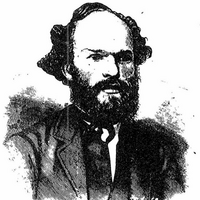A Romance of Canada
An English youth to Canada came,
A labourer, John Roe by name;
His little wealth had made him bold–
Twenty sovereigns in gold,
He was industrious and wise,
And e’en small sums did not despise ;
He added to his wealth each year,
For independence he loved dear.
He knew a labourer he would be
Forever, in the old country ;
His forefathers had tilled the ground
And never one had saved a pound ;
On beds of down they did not lie,
And frugally their goods did buy,
Their one luxury around the door
A few choice flowers their garden bore ;
But never hoped to own the soil,
But serve as hinds to sweat and toil.
To work and toil, for him had charm,
He hoped, some day, to own a farm ;
So he hired with Rueben Tripp,
The wealthiest man in the township.
Tripp’s only child, his daughter Jane,
He sought her love, and not in vain ;
As Jacob served for Rachel, dear,
So John he served, year after year–
Till, rich enough to buy bush farm
For to chop down with his strong arm.
The truest nobleman of all,
He lives not in ancestral hall,
But sheltereth family from harm
By logs rolled up with his strong arms
In this young glorious land, so free,
Where each may rear his own roof tree ;
And the chief glory of old days,
Broad fire place, where big logs did blaze–
As much as two strong men could handle–
They served alike for heat and candle.
He his young oxen did adorn
With fine gay ribbons on each horn,
And to his home with joy and pride
he did bring sweet, blooming bride
Such happiness is seldom seen,
Happier far than King or Queen ;
She helped him in the fields to reap,
And span the wool from off their sheep,
And from the yarn she wove the cloth,
All they required, they had for both,
And she was a good tailoress–
Did make his coat and her own dress.
The golden butter that she made
Was of the very finest grade ;
Each grace and virtue she possess’d–
Where ‘ere she was that spot was blessed.
And, though they did not have stove then–
Neither did they own an oven–
She filled large pot with well knead dough
And baked fine bread ’mong embers glow.
He each winter the forest trees
Did quickly hew them down with ease ;
For, he to work had a desire
And the skill did soon acquire ;
But, 'round great giants hewed a ring,
Then storms would soon them prostrate bring
For many a time the furious breeze.
Would quick o’erthrow the girdled trees,
And sometimes they would kill the cows .
When they did feed on grass or brouse.
But after reckoning damage all,
A benefit was each windfall ;-
Though good fortune now he sees
Might have been got from walnut trees.
But trees were foes, in his hurry,
All were slain, both oak and cherry,
And to this day he doth incline
To mourn o’er slaughter of the pine,
And reflects how he did o’erwhelm
Many a maple, beach and elm,
And each summer day did toil,
With his steers, drawing logs in pile.
These giants of the forest dead,
Fire did reduce to an ash bed,
And soon potatoes, wheat and corn,
They did the rugged stumps adorn.
And Jane did help him with the hoe,
And well she did keep up her row–
No organs then they had to play,
But she could work and sing all day.
In spring he did live maples tap,
To draw from them the luscious sap ;
He gathered it in big log trough,
Then boiled it down and sugared off
Enough the household for to cheer,
With all its sweets, for the whole year.
And no such thing those times were seen,
As the swift raising stump machine,
And where main road was low and damp
With logs he built a road through swamp.
But a smooth ride could not enjoy
While it was naught but corduroy–
Each year added earth and gravel,
Now smoothly o’er they can travel ;
For, it doth make an excellent road
For John and Jane to go abroad,
And it is now a great highway
Where hundreds travel every day.
There were no roads in early days,
But bridal path, their guide the blaze,
And mills and marts so far away
They never could return same day.
Log school house served as church for all
Of various creeds, and for Town Hall.
These scenes to youth do now seem strange,
So wondrous quick hath been the change.
O’er paths where oxen only trod,
Cars quickly speed o’er the railroad,
And every way, both up and down,
There has sprung up a thriving town.
No more he fights with Forest trees,
But both enjoy their wealth and ease.
Long since the old folks both are gone,
And left the whole to Jane and John.
The log house, too, hath passed away
With all its chincks filled in with clay,
And in its place fine house of stone,
With lawn where choice shrubs are grown,
With sons and daughters they are blest–
The young men say they’ll move north-west.
This gives their mother some alarm,
She wants them still on the home farm,
But father will not have them tarry–
They can plow so quick on prairie–
And they find coal makes a good fire
And build their fences of barbed wire ;
They would not be forever gone,
As they could talk by telephone,

